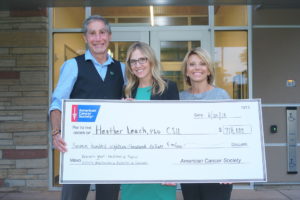Heather Leach, assistant professor in the Department of Health and Exercise Science at Colorado State University, recently received a grant from the American Cancer Society to study how to increase physical activity and quality of life in patients recovering from colorectal cancer. The $718,000 grant will run for five years.
Leach, who has a background in clinical exercise physiology, and behavioral science, with a Ph.D. in kinesiology, will be studying ways to encourage physical activity in colorectal cancer survivors.
“This grant serves multiple functions for Dr. Leach,” said Barry Braun, department head in Health and Exercise Science. “It is a very strong message from the cancer research community that she is a rising star and her research is a good investment. It has a theory-based, scientific question asking ‘what are the factors that drive behavior change?’ And, it has a direct connection to human health that we value highly in the department and college – with very tangible real-world relevance to the lives of actual cancer survivors.”
Benefits of physical activity

According to the American Cancer Society, colorectal cancer is the third most common cancer in both men and women in the U.S. There have been several studies suggesting that people diagnosed with cancer, including colorectal cancer, have lower rates of recurrence and improved survival rates if they are physically active, compared to people who are not active.
“We have lots of evidence that physical activity is very beneficial for colorectal cancer survivors,” explained Leach, “but of all survivor populations, they report the lowest activity levels.”
Leach’s study will address the need to increase physical activity in this population. Her team will bring in survivors for supervised exercise twice per week for 12 weeks.
Half of the participants will receive personal training, while the other half will be part of a group dynamics-based exercise intervention. The group intervention will focus on sections of about 5-15 people with an exercise facilitator.
“We’ll spend time doing things to enhance the way individuals in the group work together as a team,” said Leach. “We want them to be able to support each other and share their experiences with each other. The ultimate goal is using the group as a medium for physical activity behavior change. As part of that, they don’t just set individual goals, they set group goals.”
During the study, all participants will receive the same exercise dose. That includes the same amount and intensity of aerobic and resistance exercise training.
The study is a multi-site trial with branches in Fort Collins, supported by the UC Health Cancer Center – Harmony Campus, and in Aurora, supported by the University of Colorado Cancer Center and the BfitBwell exercise program.
After the 12-week intervention is finished, Leach’s team will follow the participants for another 12 months to see the long-term effects on physical activity and quality of life.
Group vs. individual approach
During the twelve months of follow-up, Leach’s team will consider factors that might contribute to participants continuing to be physical active.
In the groups, Leach’s team will use social support and group cohesion to enhance behavior change. “We’ll see if that helps participants continue exercising after the study finishes,” she said. “There’s a variety of psycho-social factors, such as self-efficacy, what they expect to gain from exercise, and where they live, that could contribute to their continued activity.”
Another factor the team will investigate is neighborhood determinants such as the number of sidewalks, parks and recreation facilities in the area and whether these help participants maintain their activity levels.
“We hypothesize that the group intervention will be superior to the personal training for helping participants maintain physical activity” said Leach. The team also suspects they will find that, even though the two groups will be getting the same amount of exercise, engaging in the group intervention and having that source of social support will improve their quality of life to a greater extent than exercise with just a personal trainer.
Leach’s research team will include several CSU students, with the aim of teaching them to apply their knowledge of behavior change, exercise science, physiology, testing, and prescription to a clinical population.
“They’ll get specific training in working with cancer patients and knowing all the different ways they need to adapt exercise for this population,” said Leach. The student team is composed of a Ph.D. student and several master’s and undergraduate students.
Mentored research grant
The American Cancer Society is funding Leach’s research through a Mentored Research Scholar Grant. As an early career investigator, Leach will be mentored through the process of completing a research study and directing her research team.
“Research mentors will help me grow in the areas where I can still learn and help me achieve my goal of becoming an independent scientist,” said Leach.
The primary mentor for the research study is Myles Cockburn, Ph.D., professor and cancer epidemiologist at the University of Colorado School of Public Health, and the co-leader of the Cancer Prevention and Control Program at the University of Colorado Cancer Center. Co-mentors are Angela Bryan, Ph.D., a professor in the Department of Psychology and Neuroscience at the University of Colorado Boulder, and Wells Messersmith, M.D., professor and head of the Division of Medical Oncology at the University of Colorado School of Medicine. Additional collaborators on this project include Paul Estabrooks, Ph.D., professor and Harold M. Maurer Distinguished Chair of the Department of Health Promotions at the University of Nebraska Medical Center, and Kate Lyden, Ph.D., research scientist at KAL Consulting LLC.
The Department of Health and Exercise Science is part of CSU’s College of Health and Human Sciences.
Gretchen Gerding contributed to this story.